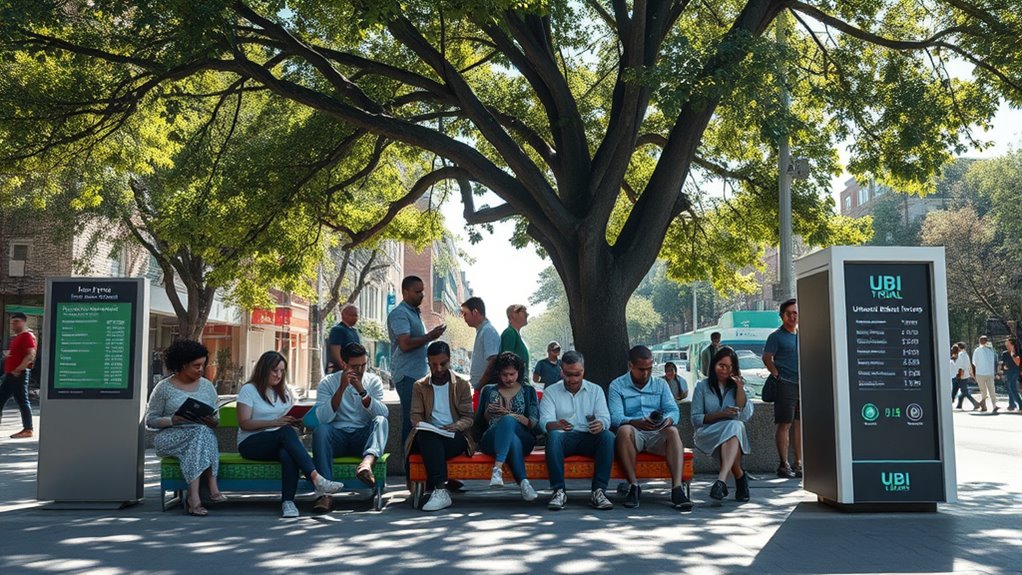Extensive UBI trials worldwide show that giving people free money does not make them lazy or stop working. These experiments reveal that most recipients don’t reduce their work effort markedly, and many use the support to pursue higher skills, caregiving, or creative projects. Instead of dependence, people often experience improved mental health, financial security, and motivation to engage in meaningful activities. To learn how this evidence challenges the lazy myth, keep exploring what recent experiments have uncovered.
Key Takeaways
- UBI trials show minimal or no reduction in work effort, with most recipients maintaining employment and only slightly decreasing hours.
- Evidence indicates that receiving free money often increases leisure time but does not lead to laziness or withdrawal from the workforce.
- UBI enhances mental health, motivation, and social well-being without causing dependency or discouraging meaningful work.
- Larger, sustained payments can promote entrepreneurship and long-term asset building rather than dependence.
- Overall research refutes the myth, demonstrating that free money through UBI supports stability and personal growth without fostering laziness.
The Structure of Major UBI Experiments and Their Designs

Most major UBI experiments are designed on a small scale and for limited durations, which affects the depth and reliability of their findings. You’ll notice that most trials target only a small portion of the population, often focusing on specific groups like low-income households, ex-prisoners, or caregivers. These experiments typically last just one to two years, providing short-term insights but little on long-term effects. Participants are usually chosen from urban or rural areas, but these samples often aren’t representative of entire nations. Payments are generally unconditional, made regularly via bank transfers, prepaid cards, or mobile money, and vary in size. Funding tends to come from reallocating existing welfare budgets, with experiments designed mainly to gather data rather than implement permanent policy. Additionally, many of these trials explore how universal basic income impacts employment and economic stability over time. Understanding the experimental design is crucial for interpreting their results accurately and assessing their potential for broader application. It’s also important to consider the sample size, as small samples can lead to misleading conclusions about the overall population. Moreover, the scale of the trials often limits the ability to generalize findings to larger, more diverse populations. Researchers also emphasize the importance of long-term effects, which are difficult to assess in short-term studies but vital for understanding true impact.
Employment and Work Effort: What the Data Reveals

The data shows that UBI doesn’t lead to widespread work reduction or shifts in job types. Instead, most recipients simply spend more time on leisure activities without markedly changing their employment patterns. This indicates that concerns about laziness may be overstated, as work effort remains relatively stable. Additionally, understanding the social determinants of health can shed light on how holistic support systems influence overall well-being beyond employment metrics. For example, access to preventive healthcare and community resources can significantly impact health outcomes regardless of income support. Recognizing the role of community engagement can further improve the effectiveness of income programs by fostering social connections that promote overall resilience. Moreover, incorporating insights from cultural practices can help tailor support systems to better meet diverse community needs. Furthermore, integrating holistic approaches into policy design can enhance the sustainability and positive impact of income initiatives.
No Work Reduction Evidence
Although concerns about widespread laziness often accompany discussions of universal basic income (UBI), the evidence from recent trials suggests otherwise. In the U.S., a $1,000 monthly UBI reduced labor force participation by only 3.9 percentage points, with participants and partners working 1–2 fewer hours weekly. Total individual income decreased by about $2,000 annually, and the main change was more leisure, not increased productivity or skill development. International trials, like Finland’s, show small increases in employment, while Alaska’s dividend had minimal impact. Overall, the data doesn’t support the idea that UBI causes widespread work withdrawal. Instead, it indicates only modest effects on effort, with some recipients using the income for education or socially valuable activities, not laziness.
Job Type Shifts
UBI can lead to meaningful job type shifts by enabling workers to pursue roles focused on skill development and training. With financial security, you might move into sectors demanding higher human capital, like vocational training or creative fields. This shift can also reduce the pressure to accept low-skill jobs immediately, encouraging long-term career planning. Additionally, stable income can foster workforce resilience, allowing individuals to explore diverse career paths without immediate financial stress. The availability of consistent support may also influence employment patterns, encouraging more strategic career choices. Here’s how different job changes look:
| Job Sector Shift | Impact on Work Type |
|---|---|
| Increased employment in higher-skill sectors | More focus on skill-building and training |
| Growth in informal/self-employment | Entrepreneurial ventures and risk-taking |
| Transition to part-time/flexible roles | Less traditional, more adaptable work |
| Leaving low-quality jobs | Prioritizing meaningful, less stressful work |
| Reallocation to caregiving/non-market activities | Valuing personal and family time |
These shifts show that UBI can expand choices, not reduce effort. Recurrences of cash support can reduce economic stress, allowing individuals to pursue employment that aligns better with their skills and interests. Additionally, a sustainable income provides stability that encourages innovation and community involvement, which can benefit broader societal well-being. Furthermore, mindset and confidence in economic security can foster a proactive approach to career development. Studies on employment flexibility indicate that financial security can also promote healthier work-life balance and job satisfaction.
Income, Savings, and Economic Resilience Outcomes

UBI can improve your financial security by reducing income uncertainty and allowing for better planning. Many recipients save more and build higher cash reserves, which can enhance resilience during tough times. However, increased savings often come with more debt, raising questions about long-term financial stability. Recent trials indicate that while short-term financial relief is evident, long-term benefits remain uncertain, particularly when increased debt offsets savings gains. Additionally, the impact on cybersecurity and digital financial behaviors is an emerging area of interest, as more recipients rely on online banking and digital wallets. Furthermore, studies suggest that the relationship dynamics within couples can be influenced by receiving unconditional income, affecting overall financial behaviors. The evolving landscape of data privacy challenges underscores the importance of secure digital financial practices as reliance on online platforms grows. Moreover, the digital divide can influence how effectively different populations benefit from digital financial services, impacting overall economic resilience.
Enhanced Financial Security
By providing unconditional, regular cash transfers, Universal Basic Income enhances financial security for individuals, allowing you to stabilize your income and reduce daily financial stress. With consistent payments, you can better cover basic needs without depending on unstable or low-wage jobs. Evidence from the Alaska Permanent Fund shows increased purchasing power and job growth, giving you more labor market choices. UBI also helps you manage income fluctuations during job loss or emergencies, preventing you from falling into poverty. It reduces reliance on high-interest debt and informal loans, strengthening your economic resilience. You’re better positioned to maintain essential spending during crises, fostering stability. Overall, UBI’s financial security benefits enable you to plan longer-term, invest in assets, and build economic resilience against shocks. Universal Basic Income can also provide a safety net that encourages people to pursue education or training without the immediate pressure of financial survival.
Boosted Savings Habits
When your financial security improves through regular, unconditional cash transfers, you’re more likely to develop stronger savings habits. Evidence from UBI trials shows about 6% of funds are allocated to saving and investing, demonstrating a focus on asset building rather than immediate spending. When income security increases, you can better plan for the future and invest in education, healthcare, or housing, boosting resilience. The predictability of payments reduces impulsive decisions, helping you save more effectively. Many recipients use UBI to build emergency funds, providing stability during economic shocks. Data also indicate that, after covering basic needs, you tend to allocate surplus funds toward savings rather than consumption. Larger, consistent payments further encourage saving, supporting long-term financial independence and reducing reliance on high-cost borrowing. Research indicates that recipients of UBI are more likely to report increased household savings and financial security, further strengthening their economic resilience.
Insights From Large-Scale International UBI Trials

Large-scale international trials provide valuable insights into how different designs and contexts influence the outcomes of Universal Basic Income programs. You’ll see that lump sum payments often have a stronger impact on entrepreneurship and economic activity than regular, short-term payments. Recipients of lump sums tend to create more businesses, boost household income, and better address poverty by saving for large purchases. Short-term UBI, however, results in smaller boosts to economic output and fewer new enterprises. Regarding work, trials show recipients reduce work hours slightly but continue employment, often using extra time for education or training. Overall, these trials reveal that UBI improves mental health, reduces financial stress, and enhances household stability, with outcomes varying based on payment structure and country context.
Behavioral Effects and the Myth of Laziness

Many people assume that giving unconditional cash payments encourages laziness and reduces motivation to work, but the evidence tells a different story. Most studies show UBI and cash transfers don’t substantially lower employment rates. When small declines occur, they’re minimal—a 10% income increase might reduce work by about 1%. In developed countries, most recipients’ likelihood of working remains unchanged. UBI trials reveal some reduce hours or take breaks, but rarely exit the labor force entirely. Here’s a quick comparison:
| Effect | Observation |
|---|---|
| Work reduction | Minimal, often insignificant |
| Employment rates | Mostly unaffected |
| Target groups | More noticeable changes |
| Crime & risky behaviors | Decreased with cash support |
| Negative behaviors | No evidence of increase |
Shifts in Job Types and Self-Employment Patterns

UBI’s financial safety net often leads people to reevaluate their job choices, resulting in shifts toward more flexible and fulfilling work arrangements. With a financial cushion, you might feel less pressured to accept unsatisfactory jobs and instead search for roles better suited to your skills or interests. This flexibility can increase part-time or gig work, and some evidence suggests fewer hours worked but not a mass exit from the labor market. Additionally, UBI may encourage risk-taking in entrepreneurship, reducing financial barriers for low-income individuals to start businesses. Geographic mobility can improve as you feel freer to move for better opportunities or passage between jobs without losing benefits. Overall, UBI supports a more adaptable labor landscape, fostering meaningful work and reducing traditional employment constraints.
Impact on Well-Being and Life Satisfaction

When you receive a basic income, you often feel more in control of your life and choices. This boost in agency can lead to greater psychological well-being, making everyday challenges easier to manage. As a result, your overall life satisfaction tends to improve, even without a change in income levels.
Enhanced Psychological Well-Being
Have you ever wondered how a basic income might influence your mental health and overall happiness? Studies show that most recipients experience significant improvements in psychological well-being. About 80% report better mood, higher life satisfaction, and greater daily functioning, especially among low-income and marginalized groups. Many describe feeling more secure and dignified, which boosts their emotional resilience. Additionally, around 78% feel less anger, thanks to increased financial stability and reduced interpersonal conflicts. A striking 86% cite a more hopeful outlook, enabling them to plan for the future and set new goals. This sense of security and optimism diminishes stress, anxiety, and depression symptoms for many. Unconditional cash support fosters emotional stability, helping you feel more in control and fostering positive daily experiences.
Increased Sense of Agency
A heightened sense of agency emerges as a key benefit of universal basic income, empowering you to make more autonomous decisions about your life. When you have a reliable income, you feel more in control and confident in your choices. This boost in personal agency can improve your overall well-being and life satisfaction. With UBI, you’re freer to pursue meaningful work or education, supporting your long-term goals. It also allows you to prioritize family care or entrepreneurial ventures without constant financial worry. The sense of independence fosters social participation and reduces stress, helping you feel more connected and optimistic.
- Make financial decisions with confidence
- Choose work that truly matters to you
- Focus on family and personal growth
- Feel more secure and hopeful about the future
Economic Stability and Financial Security Improvements

Universal Basic Income (UBI) directly enhances your financial security by providing a reliable income stream regardless of employment status. It reduces income volatility, offering a financial safety net during economic shocks like job loss or illness. This stability helps you avoid sudden poverty and keeps household budgets more predictable, especially during downturns. With UBI, you’re less dependent on debt or credit to cover essentials. It guarantees a steady income, lowering anxiety about job security and enabling better planning for long-term goals, such as healthcare or education. By decreasing reliance on means-tested benefits, UBI also narrows income gaps. Overall, it promotes more stable consumption and elevates your sense of financial security, making you less vulnerable to economic uncertainties.
Evidence From U.S. and Global UBI Pilots

What does real-world experience tell us about the impact of guaranteed income programs? It shows that these programs often boost well-being without reducing work. For example, in Los Angeles, $1,000 monthly helped people find jobs or go back to school. Over 100 U.S. pilots provide unrestricted cash, improving health, food security, and housing. Globally, UBI doesn’t decrease work hours but shifts occupational choices toward entrepreneurship. Recipients increase savings and productivity, especially among those in poverty. Larger lump sums, like $500, boost economic stability more than smaller payments. Importantly, these programs don’t lead to increased substance abuse. Overall, evidence suggests guaranteed income enhances financial independence, mental health, and social outcomes—without making people lazy or less motivated.
What We Can Conclude About Work and Free Money

While concerns about laziness often accompany discussions of guaranteed income, real-world evidence shows that UBI doesn’t discourage work; instead, it shifts motivations and choices. UBI can reduce external pressure by easing financial necessity but doesn’t eliminate the desire to work. It encourages individuals to focus on intrinsic interests, leading to higher job satisfaction and better career alignment. With financial stability, people often choose higher-quality jobs or pursue personal development, rather than simply working less. Studies indicate that work hours may decrease slightly, but productivity and motivation remain stable. UBI also allows for more flexible schedules and social engagement, fostering creativity and well-being. Overall, UBI supports meaningful work and personal growth without causing widespread laziness.
Frequently Asked Questions
How Do UBI Trials Vary Across Different Countries and Cultures?
You’ll notice that UBI trials differ widely across countries and cultures. In some places, like Kenya, programs focus on long-term support for the poor, while in Finland, short-term pilots test impact. Cultural factors influence how trials are designed, targeting specific populations and adjusting payment amounts. Funding sources and local economic conditions shape these models, ensuring they fit the unique social and cultural contexts of each community.
What Long-Term Effects Do UBI Programs Have on Community Development?
Imagine a garden where each seed represents a community member’s potential. UBI programs help nurture this garden, fostering growth in local businesses, improving access to healthcare, and strengthening social bonds. Over time, communities become more resilient, adaptable, and united, weathering economic storms with greater ease. While progress varies, well-designed UBI initiatives can cultivate vibrant, supportive environments where everyone has a chance to flourish and contribute meaningfully.
Are There Any Unintended Negative Consequences of Implementing UBI?
You might worry that implementing UBI could lead to unintended negative consequences. It can cause a reduction in labor participation, which might slow economic growth and lower tax revenues. Additionally, some recipients may experience decreased productivity, mental health issues, or social exclusion. You should also consider administrative challenges, funding difficulties, and concerns about UBI’s effectiveness in addressing social justice and poverty, potentially resulting in more harm than intended.
How Do Recipients Perceive and Value the Cash Transfers?
You might think cash transfers are just handouts, but recipients see them as lifelines that transform lives. They value the financial security, reduced stigma, and increased autonomy these payments provide. Many feel more confident, invest in their futures, and even start businesses. These transfers boost mental health, strengthen family bonds, and foster social participation, proving they’re not just money—they’re catalysts for real, lasting change.
What Are the Cost and Funding Considerations for Large-Scale UBI Implementation?
You should consider that implementing UBI on a large scale involves significant costs, like billions annually in the UK and trillions in the US, mainly due to payments and administrative expenses. Funding options include consumption taxes or shifting tax burdens, but each has trade-offs, such as reduced economic output or increased inequality. Balancing costs, funding sources, and economic impacts is essential to making UBI sustainable and effective.
Conclusion
Looking at the evidence, it’s clear that free money doesn’t turn you into a slacker’s dream. Instead, it acts like a safety net, catching you when life nudges you off balance. Far from fostering laziness, UBI trials show it can boost well-being, save you from financial storms, and even encourage you to pursue work that truly matters. Think of it as a sturdy bridge, helping you cross over hardship towards a more secure, fulfilling future.









